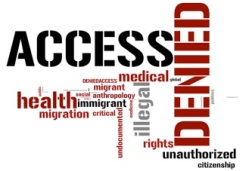Archive
AccessDenied post wins 2nd prize in competition for Excellence in Writing to Advance Social Justice
Hearty congratulations to AccessDenied contributor Rachel Stonecipher, whose recent piece “Shattered by Security: The Impact of Secure Communities on Families” has been awarded second prize in the Harriet Beecher Stowe Center’s 2012 Student Prize Competition For Excellence in Writing to Advance Social Justice.
The prize, named for the renowned author of the monumental anti-slavery novel Uncle Tom’s Cabin, “recognizes outstanding writing by U.S. high school and college students that motivates positive action for social justice.”
Stonecipher is a senior double-major in Anthropology and Film & Media Arts at Southern Methodist University in Dallas, Texas. After college she plans to pursue a Ph.D. in anthropology with a focus on medical anthropology, im/migration and health, the anthropology of experience, and public anthropology. She is currently engaged in the second phase of a two-year research project on the practice and experience of migrant advocacy work on the U.S.-Mexico border, supported by the Engaged Learning program at SMU.
“Shattered by Security” is Stonecipher’s second contribution to AccessDenied. An earlier co-authored piece, “Call It a Crisis: Confronting Public Health Risks on the U.S.-Mexico Border,” was published last August. Her third contribution, a reflection on her participant observation with the NGO No More Borders, which provides water and emergency medical assistance to migrants crossing the U.S.-Mexico border, will be published shortly.
Congratulations, Rachel!
Benefits vs. Ethics? Re-Assessing Healthcare Access for the Undocumented in France – Stéphanie Larchanché
Stéphanie Larchanché
IRIS-EHESS and Centre Françoise Minkowska, Paris
In March 2010, the French National Assembly voted to further limit healthcare access to the undocumented. Since 2001, State Medical Aid (AME) has provided undocumented immigrants living in France with free healthcare coverage. To be eligible for AME, one must provide proof of residence in France for a minimum of three months and evidence of limited monthly income (below 634 euros). Soon after this arrangement was created, however, additional restrictions were added as requirements for access to AME including presentation of a valid government-issued ID, presentation of a housing certificate – which can only be received via specific state-mandated social services – and a mandatory minimum service fee for health services. On March 2nd, 2010, following discussions on budget restrictions, center-right Assembly representative Dominique Tian proposed still more limitations on AME, including the addition of a 30 euro application fee and additional restrictions on covered healthcare services. According to Tian, «If one is willing to pay several thousands of euros to come to France, I doubt that a 30 euro application fee will prevent one from accessing care.»
Expanding Vulnerability: Health Care, Well-Being, and Arizona’s Immigration Policies – Julie Armin & Robin Reineke
Julie Armin & Robin Reineke
University of Arizona
Arizona has seen a systematic attack on immigrants over the past year. Several anti-immigrant measures have passed through the legislature in recent months, and more are in the planning stages. Through the everyday enforcement of these policies, the borders of the United States are re-inscribed on bodies and within communities, creating “legal” and “illegal” categories of people who have differential access to state resources and services. Nicholas De Genova argues that ‘illegality’ “is an erasure of legal personhood” that is designed not to physically exclude individuals, but “to socially include them under imposed conditions of enforced and protracted vulnerability.”[1] These constructed categories can expand, compromising the well-being of those who seem to fall outside their initial reach, as friends, co-workers, teachers, doctors, and community members are implicated. Read more…
Access Not Denied? The Role Localities Can Play – Helen B. Marrow
Helen B. Marrow
Universities of California at Berkeley and San Francisco
Mounting evidence shows that rather than overusing healthcare services, as both the American public and its elected officials frequently allege, unauthorized immigrants actually suffer from serious healthcare disparities.[i] A few localities around the United States have implemented noteworthy measures to improve unauthorized immigrants’ healthcare access and reduce these disparities. My research from San Francisco demonstrates how, and why, such measures work.
Unauthorized immigrants have long been deemed “undeserving” of most forms of health care in the United States, especially since the mid-1970s, when the first legal status restrictions on a variety of government programs, including Medicare and Medicaid, were enacted (Fox 2009). Read more…
